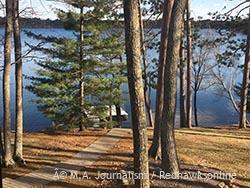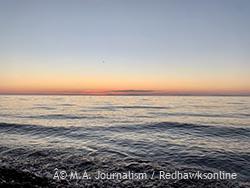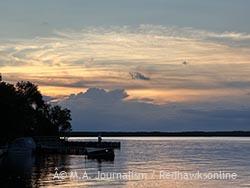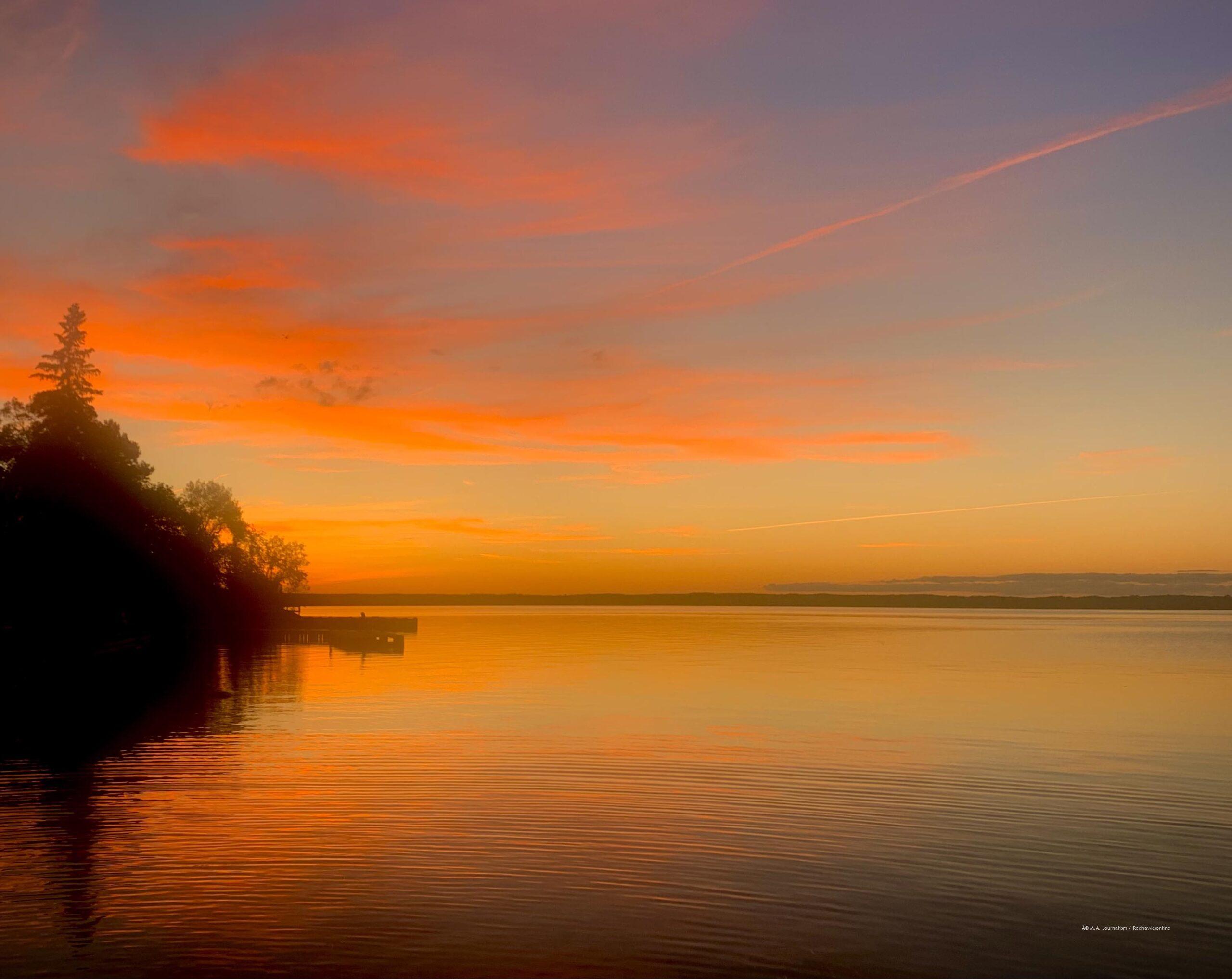Climate change brings drought, hotter temperatures, and polluted lakes
At dawn, early in the morning before the ruckus of the world awakens, the lake water stands glassy and still. A few lines drop in the water, creating ripples, the only movement on the water, and everyone stands quiet, patiently awaiting biting fish. Peaceful excitement and anticipation for the fish linger. Junior Lydia Brown describes her lakeside cabin.

Photo by Lydia Brown Brown’s cabin right when the sun came up during the summertime.
“I look forward to fishing and swimming in the lake with my cousins and just overall having a good time,” said Brown.
Water is highly abundant in “the land of 10,000 lakes” and many people partake in outdoor activities with the copious natural resources. Minnesota is often thought of as a sort of tundra in the US, with extremely cold temperatures and snow falling by the foot. Despite this, Minnesota is not immune to the effects of climate change. The climate crisis has been unfolding rapidly in the United States. Between peak ocean temperatures in the Gulf of Florida, hurricanes blundering through California, and devastating wildfires in Hawaii, the climate crisis and the effects of climate change should be at the top of both governmental and citizen priority lists. Heavy precipitation, lack of rainfall, and the warming of the state lead to environmental concerns and devastating realities for the future of recreational activities in MN. Minnesotan residents and farmers rely on rainfall in their everyday lives. The influence of rainfall in MN is crucial for things like personal gardens, farm fields, and freshwater cleanliness. So when the amount of water is not adequate, detrimental effects can happen.
Currently, serious drought conditions are exhibited in Minnesota because of heat and the lack of rainfall. According to the National Weather Service, reported by CBS News, June 2023 was the second driest June of all time in Minnesota. The total rainfall for June “stood at 0.93 inches of rain,” which “puts this year just behind 1988 for aridity; that year only saw 0.22 inches of precipitation.” June is supposedly the month with the most precipitation with an average precipitation rate of 4.58 inches (NWS, CBS).
In the remaining months of 2023 and into 2024, Minnesota will need above-average precipitation to catch up on the lost water in June, uncorrupted by high temperatures.
“I think some of the recent weather that we’ve had with extreme heat for multiple days is kind of a new thing for this region,” Carmella Whaley, who teaches biology and environmental science said. “It’s going to affect farmers, and the production of crops, whether they’re for human consumption or for feeding.” As mentioned, Minnesota is unusually dry. But even though Min-
Minnesota is in a drought right now, it does not reflect the common trend for the state in recent years. Heavy precipitation including rainfall and snowfall is the upward trend.
Kenny Blumenfeld, climatologist with the Department of Natural Resources in the state climatology office, told the Talon, “We see increases in average temperature, and we see increases in average precipitation annually, it’s not like every year is warmer or wetter than the year before. We still get cool years and we still get dry years, but the general trend since about 1970 has been much warmer conditions and more precipitation.”

Photo by Anavie Bernick The shore of Lake Superior in Duluth, MN
Heavy precipitation leads to polluted lakes through water run-off and creates wetter, heavier snow making many winter activities harder to do. When water from excess rainfall flows into lakes, all the herbicides, pesticides, and additional pollutants from the ground get into the water, and they lead to unsafe swimming conditions and unsafe habitats for fish, resulting in the decline in available bodies of water for fishing and other beloved activities of MN “Lake life”. So, there needs to be a healthy balance of not too much or too little rainfall.
Additionally, with the heavier snowfall, the ability to do activities like ice fishing, snowshoeing, and Minnehaha Academy favorite, Nordic skiing dwindles. Last winter 85 MA students played on the Nordic ski team.
“Our Nordic team skis on man-made snow more and more each year since there isn’t enough natural snow,” said MA’s Nordic coach Britt Guild. “It’s amazing that an entire sport has changed because of global warming.”
This raises questions about what people can do to combat the change of the climate and its effects. Well, the truth of the matter is the climate has already changed and will continue to change.
“The number one thing and the only thing that matters for stopping these changes, is quickly reducing the amount of greenhouse gasses that we put in the atmosphere,” Blumenfeld said. He explained that the climate is working on a “lag system”.
If something is done today like eating less meat, or carpooling, the climate will not change tomorrow. Eliminating CO2 from the atmosphere takes decades.
“The only way that we’re going to solve this issue is to significantly reduce, and eventually neutralize, then start to decrease our greenhouse gas emissions and concentrations and try and push them down to a level that is a little bit more natural for the planet,” said Blumenfeld.

Photo by Anavie Bernick A sunset on Lake Kabetogama in Voyagers National Park
If Minnesotans want to continue swimming, fishing, snowshoeing, skiing, et cetera, all things that make up popular pieces of MN’s natural culture, they have to think consciously about the future. As well as encourage each other to participate in sustainable practices and elect policymakers with goals for the betterment of MN’s climate practices. Even though a single thing done today will not affect tomorrow, if everyone does single things every day, positive outcomes will happen for future generations.

